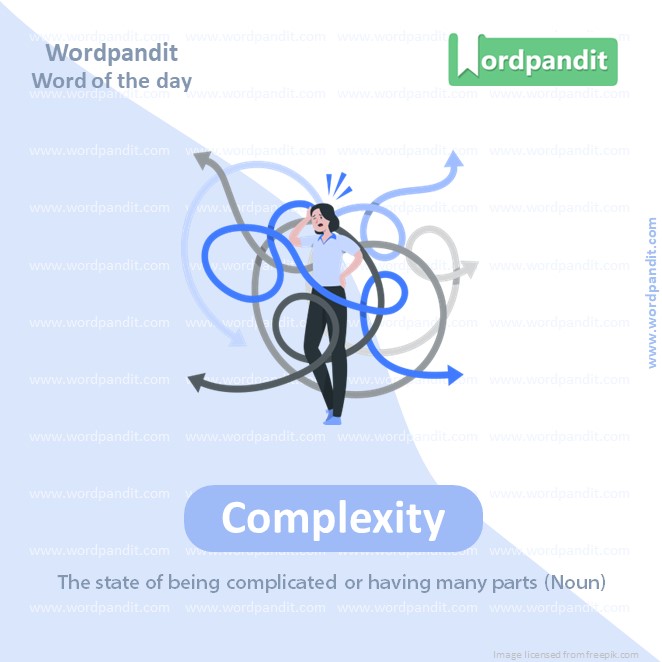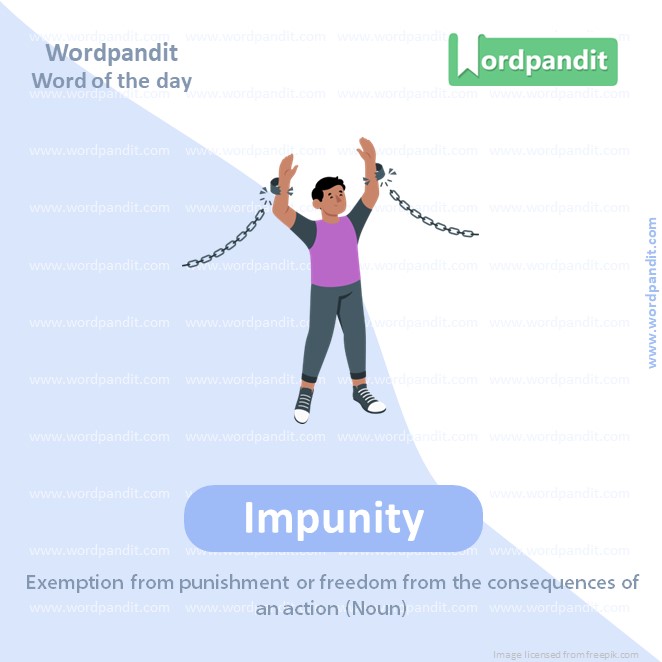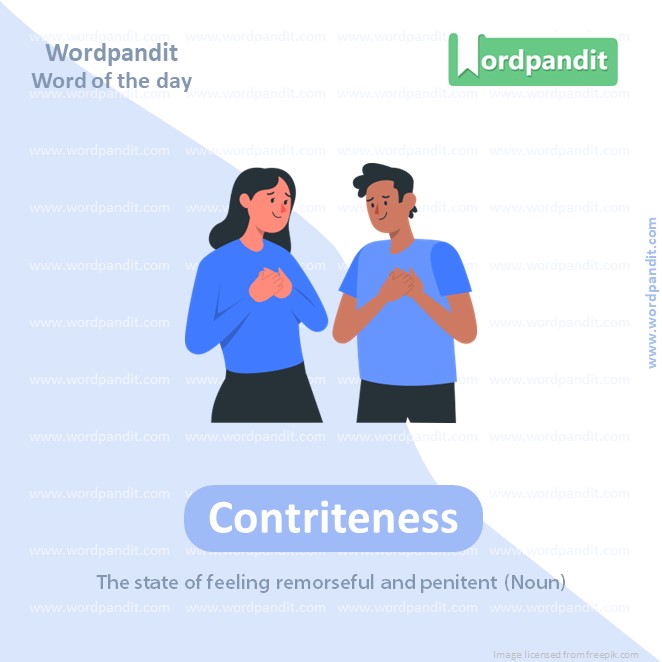Daily Vocabulary from Indian Newspapers and Publications
Welcome to Wordpandit’s Indian Vocabulary Hub
At Wordpandit, we understand the importance of staying rooted in the local context while expanding your language skills. This section focuses on enriching your vocabulary with words and phrases drawn from India’s leading newspapers and publications, ensuring you're learning vocabulary that is practical, relevant, and uniquely Indian.
Why Indian Sources Matter
We believe that the best way to master any language is by immersing yourself in local content. That’s why we carefully curate vocabulary from top Indian publications, including:
- The Hindu
- The Times of India
- The Economic Times
- Hindustan Times
- Live Mint
- The Indian Express
- And many others...
Stay Updated, Stay Relevant
With daily updates from Indian news sources, you’ll be consistently learning words that reflect the trends and shifts in Indian society and culture. Our focus is to provide vocabulary that enhances your understanding of the language in an Indian context.
How Wordpandit Supports Your Goals
Whether you’re preparing for exams, aiming to improve your professional communication, or simply want to stay connected with the latest Indian vocabulary, Wordpandit is here to guide you every step of the way.
Learn with a Practical Approach
Our interactive learning methodology includes real-world examples, engaging activities, and context-specific usage to ensure that every word becomes part of your active vocabulary.
Dive into Indian Vocabulary Today!
Why Choose Wordpandit?
Practical Learning: Focus on words you'll actually encounter in real-world reading, enhancing your comprehension and communication skills.
Diverse Content: From current affairs to scientific breakthroughs, our varied sources expose you to vocabulary across multiple domains.
Effortless Integration: Make Wordpandit a part of your daily routine. Just a few minutes each day can significantly boost your lexicon over time.
Your Path to Vocabulary Mastery
- Visit our Daily Vocabulary section regularly
- Explore new words and their usage in context
- Practice incorporating these words into your own writing and speech
- Track your progress as your vocabulary expands
Start Your Journey Today
Embark on your vocabulary enhancement journey with Wordpandit. By consistently engaging with our daily posts, you'll build a robust vocabulary that serves you well in academic, professional, and personal contexts.
Remember, a word a day keeps linguistic limitations at bay. Make Wordpandit your daily companion in the quest for vocabulary excellence!
WORD-1: Complexity
Context:
"That does not detract from the complexity of piracy or the reality that no theory fully captures its essence." - Indian Express
Explanatory Paragraph:
"Complexity" refers to the state of being intricate or complicated. When we say something has complexity, it means it's made up of many parts, often interacting in ways that are not straightforward or easy to understand. In the context of piracy, this word suggests that the issue is layered—rooted in history, economics, politics, and human behavior—and cannot be explained by a single theory or viewpoint.
Meaning: The state of having many parts and being difficult to understand or analyze (Noun)
Pronunciation: kom-plek-suh-tee
Difficulty Level: ⭐⭐ Beginner to Intermediate
Etymology: From Latin "complexus" meaning "entwined, embraced", from "com-" (together) + "plectere" (to braid or weave)
Prashant Sir's Notes:
"Complexity" is an essential academic and analytical word. It’s used in everything from politics to physics. Always be mindful that the presence of complexity does not mean confusion—it just shows depth and nuance.
Synonyms & Antonyms:
Synonyms: intricacy, complication, sophistication, difficulty
Antonyms: simplicity, clarity, plainness, straightforwardness
Usage Examples:
- The complexity of the legal system can be overwhelming for the average person.
- She admired the complexity of the novel’s plot and character development.
- Modern technology often brings with it a new level of complexity in daily life.
- The professor explained the complexity of climate change in simple terms.
Cultural Reference:
"The truth does not change according to our ability to stomach it emotionally." – Flannery O'Connor. Her works often dealt with moral and psychological complexity in human nature. - Literary Analysis
Think About It:
Is complexity always a negative thing, or can it be a sign of richness and depth in a system, idea, or individual?
Quick Activity:
List three situations in your life that involve complexity. Now try breaking each one down into simpler components. Can you better understand the whole picture?
Memory Tip:
Think of “complexity” as a “complex city” – a city with many roads, buildings, and people. Just like a city, something complex has many interconnected parts.
Real-World Application:
Understanding complexity is crucial in fields like law, medicine, economics, and politics, where decisions require analyzing multiple layers of information and consequences.
WORD-2: Impunity
Context:
"The lessons of the Bilkis Bano case are that the dignity, liberty, privacy and human rights of citizens are violated with impunity." - Indian Express
Explanatory Paragraph:
"Impunity" means being free from punishment or the negative consequences of one's actions, especially when wrongdoing is involved. When someone acts with impunity, it means they do something wrong or harmful but face no consequences. In the context of the Bilkis Bano case, it highlights how serious human rights violations were committed, yet the offenders operated without fear of being held accountable.
Meaning: Exemption or freedom from punishment, harm, or loss (Noun)
Pronunciation: im-pyoo-ni-tee
Difficulty Level: ⭐⭐⭐ Intermediate
Etymology: From Latin "impunitas", from "in-" (not) + "poena" (punishment)
Prashant Sir's Notes:
"Impunity" is often used in legal, political, and human rights contexts. It reflects a deep failure of justice systems and governance. Whenever you hear this word, think of unchecked power or abuse going unpunished.
Synonyms & Antonyms:
Synonyms: immunity, exemption, absolution, license
Antonyms: accountability, punishment, responsibility, liability
Usage Examples:
- Corrupt officials often act with impunity due to weak enforcement of laws.
- War crimes committed with impunity undermine the credibility of international justice.
- The hacker operated with impunity, evading authorities for years.
- No one should be allowed to violate another’s rights with impunity.
Cultural Reference:
"Where justice is denied... where ignorance prevails... neither persons nor property will be safe." — Frederick Douglass. His words echo the dangers of impunity in society. - American Abolitionist Movement
Think About It:
What are the long-term effects on society when crimes are committed with impunity?
Quick Activity:
Write a short paragraph describing a fictional situation where someone acts with impunity. Then rewrite it imagining justice is served. Compare both versions.
Memory Tip:
Think “im-punish-ity” — the absence of punishment. If you break it down, it sounds like “I’m punishment-free.”
Real-World Application:
"Impunity" is a crucial concept in legal systems, journalism, and activism. It helps highlight cases where laws are ignored and victims are denied justice—key in advocating for accountability.
WORD-3: Bereaved
Context:
"None could have poured out the anguish of a human better than an abused, violated and bereaved mother by name Bilkis Bano." - Indian Express
Explanatory Paragraph:
The word "bereaved" describes someone who has lost a loved one, typically through death. It captures the deep emotional pain, sorrow, and grief that follow such a loss. In the context of the Bilkis Bano case, "bereaved" reflects not only the loss of family members but also the immense emotional suffering she endured. It conveys a quiet, dignified pain that words can barely capture.
Meaning: Suffering the loss of a loved one, especially through death (Adjective)
Pronunciation: buh-reevd
Difficulty Level: ⭐⭐ Beginner to Intermediate
Etymology: From Old English "bereafian," meaning to deprive or take away by violence
Prashant Sir's Notes:
"Bereaved" carries a deep emotional weight. It's not just about loss, but the emotional void that follows. It’s important to use this word with sensitivity, especially when referring to someone’s personal tragedy.
Synonyms & Antonyms:
Synonyms: grieving, sorrowful, mourning, heartbroken
Antonyms: comforted, consoled, joyful, at peace
Usage Examples:
- The bereaved family struggled to cope with the sudden loss.
- Community members gathered to support the bereaved after the tragic accident.
- She looked after the bereaved children with immense love and patience.
- The ceremony was held in honor of the bereaved, offering prayers and condolences.
Cultural Reference:
In many cultures, rituals like wearing black, lighting candles, or holding memorials help the bereaved express grief and find healing. These practices acknowledge the pain and give communal support. - Cross-Cultural Grief Traditions
Think About It:
How can society better support the bereaved beyond just offering condolences?
Quick Activity:
Write a short note of empathy or condolence that you might give to someone who is bereaved. Focus on being sincere and respectful.
Memory Tip:
Think of “bereaved” as “be-reaved” — to be robbed of someone you love. It reflects the emotional loss just like a physical theft.
Real-World Application:
The word "bereaved" is commonly used in counseling, healthcare, news reports, and legal documents when referring to individuals or families coping with loss. It helps in addressing grief with compassion and accuracy.
WORD-4: Contriteness
Context:
"The released convicts did not show any contriteness; nor did they walk into the sunset." - Indian Express
Explanatory Paragraph:
"Contriteness" refers to the state of feeling deep regret and sorrow for having done something wrong. It suggests genuine remorse, often accompanied by a desire to make amends. In the context of the given sentence, the lack of contriteness in the convicts implies a disturbing absence of guilt or acknowledgment of wrongdoing, even after being released for a serious crime. This highlights a moral failure that goes beyond legal punishment.
Meaning: The quality of being remorseful or filled with guilt for a wrongdoing (Noun)
Pronunciation: kuhn-trite-ness
Difficulty Level: ⭐⭐⭐ Intermediate
Etymology: From Latin "contritus" meaning "worn out, ground to pieces," used in Church Latin to signify "crushed in spirit by a sense of sin"
Prashant Sir's Notes:
"Contriteness" is a powerful emotional and ethical word. It goes deeper than just saying sorry—it’s about feeling and showing sincere regret. It’s commonly used in moral, legal, and religious contexts, especially when referring to repentance or atonement.
Synonyms & Antonyms:
Synonyms: remorse, regret, penitence, repentance, sorrow
Antonyms: indifference, defiance, pride, shamelessness
Usage Examples:
- His contriteness during the apology felt genuine and moved many in the audience.
- The judge noted the convict’s contriteness as a factor in reducing the sentence.
- She showed no contriteness after the argument, which hurt her friend even more.
- In many cultures, public acts of contriteness are expected after moral failings.
Cultural Reference:
In religious traditions like Christianity, contriteness is a key step toward redemption. For instance, in Catholic confession, expressing contriteness is essential before forgiveness is granted. - Catechism of the Catholic Church
Think About It:
Is contriteness meaningful only when expressed, or does it hold value even when felt silently?
Quick Activity:
Think of a time when you or someone you know made a mistake. Reflect: Was there contriteness? How was it shown—or not shown?
Memory Tip:
Break it into “con-TRITE-ness.” If something feels “trite” (fake or insincere), then “contriteness” is the opposite—true, heartfelt remorse.
Real-World Application:
"Contriteness" is often evaluated in courtrooms, therapy sessions, and leadership roles. Whether in a political apology or personal relationship, showing true contriteness can influence how others respond to a mistake or wrongdoing.
WORD-5: Reverence
Context:
"They were welcomed and feted with garlands and sweets. Some in the welcoming party touched their feet, showing reverence." - Indian Express
Explanatory Paragraph:
"Reverence" is a deep feeling of respect, often mixed with awe or devotion. It's more than just politeness—it reflects a spiritual, cultural, or moral admiration for someone or something. In the sentence, the act of touching feet—a gesture common in many Indian traditions—shows reverence, indicating the people involved viewed the individuals with honor or respect, despite the controversial context. This choice of word adds a complex emotional and cultural layer to the scene.
Meaning: Deep respect for someone or something, often tinged with awe or devotion (Noun)
Pronunciation: rev-er-uhns
Difficulty Level: ⭐⭐ Beginner to Intermediate
Etymology: From Latin "reverentia" meaning "awe, respect," from "revereri" – to stand in awe of
Prashant Sir's Notes:
"Reverence" is a high form of respect—often reserved for elders, deities, leaders, or sacred traditions. The word carries both emotional and cultural weight. Be cautious: when used in inappropriate contexts (like in this news report), it can highlight uncomfortable societal contrasts.
Synonyms & Antonyms:
Synonyms: respect, veneration, admiration, devotion, awe
Antonyms: disrespect, irreverence, scorn, disdain
Usage Examples:
- Many people show reverence to their teachers by touching their feet during festivals.
- The audience listened in reverence as the spiritual leader spoke.
- She handled the ancient manuscript with great reverence and care.
- His reverence for nature inspired him to become an environmental activist.
Cultural Reference:
In Indian tradition, reverence is often shown by touching the feet of elders, gurus, or spiritual figures. This gesture symbolizes humility, respect, and acknowledgment of wisdom. - Indian Cultural Etiquette
Think About It:
Can showing reverence to someone ever be morally problematic? What if the person is undeserving of such respect?
Quick Activity:
List three people or things you truly revere. Then reflect on what makes them worthy of that deep respect.
Memory Tip:
Reverence sounds like “revere,” which means to honor deeply. Think: “Reverence = Respect + Awe.”
Real-World Application:
"Reverence" is often used in religious, cultural, and formal settings—like in speeches, rituals, or even in corporate values when talking about respecting legacy or tradition.



















